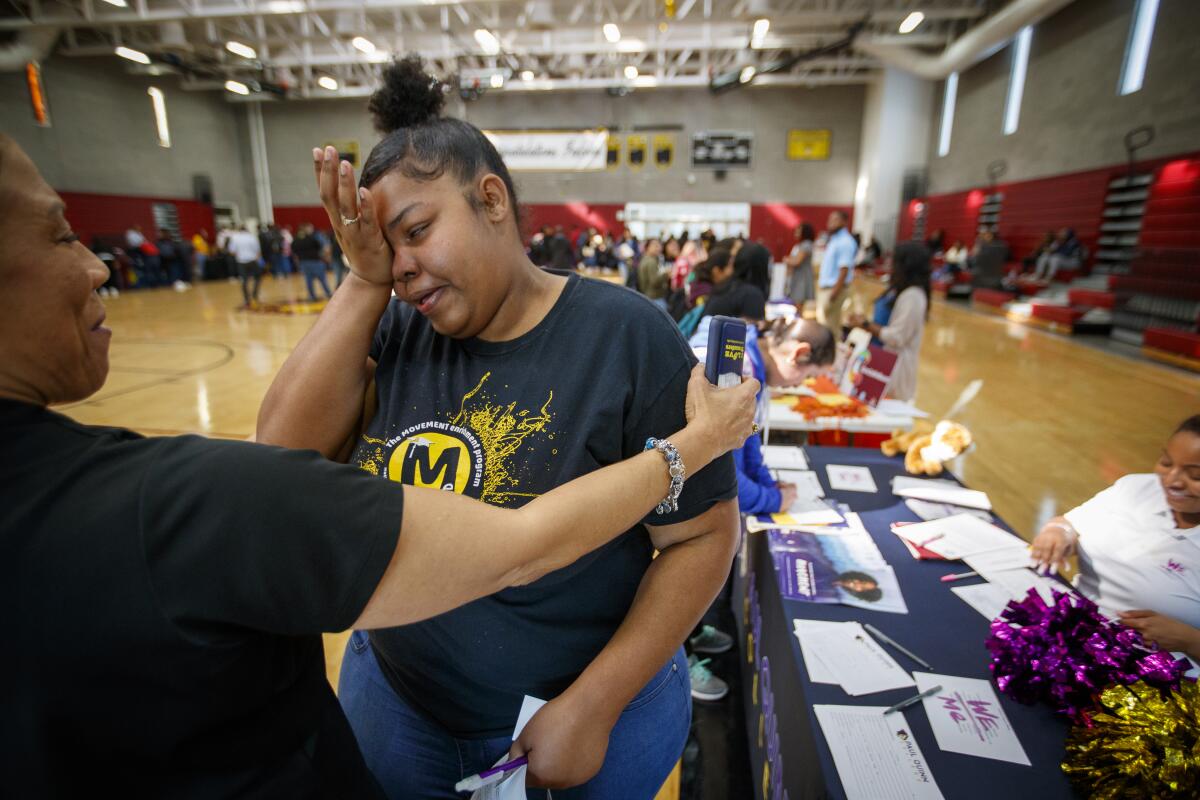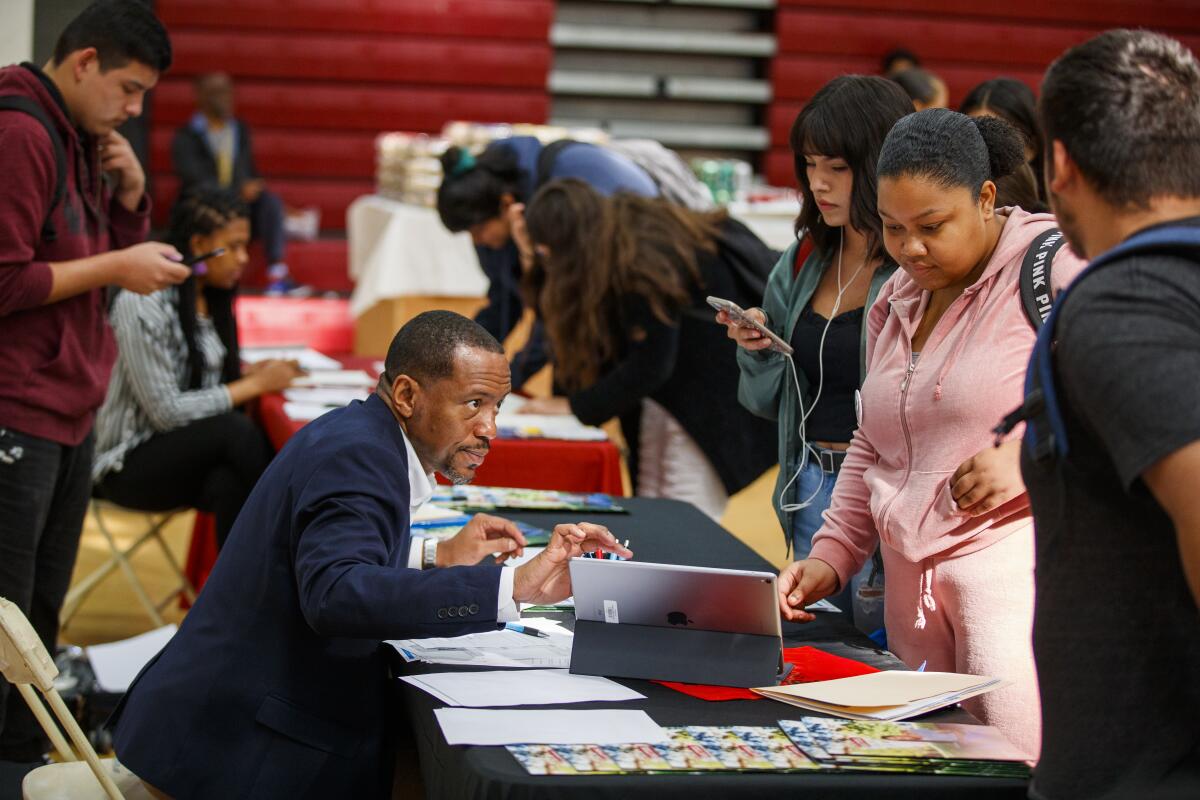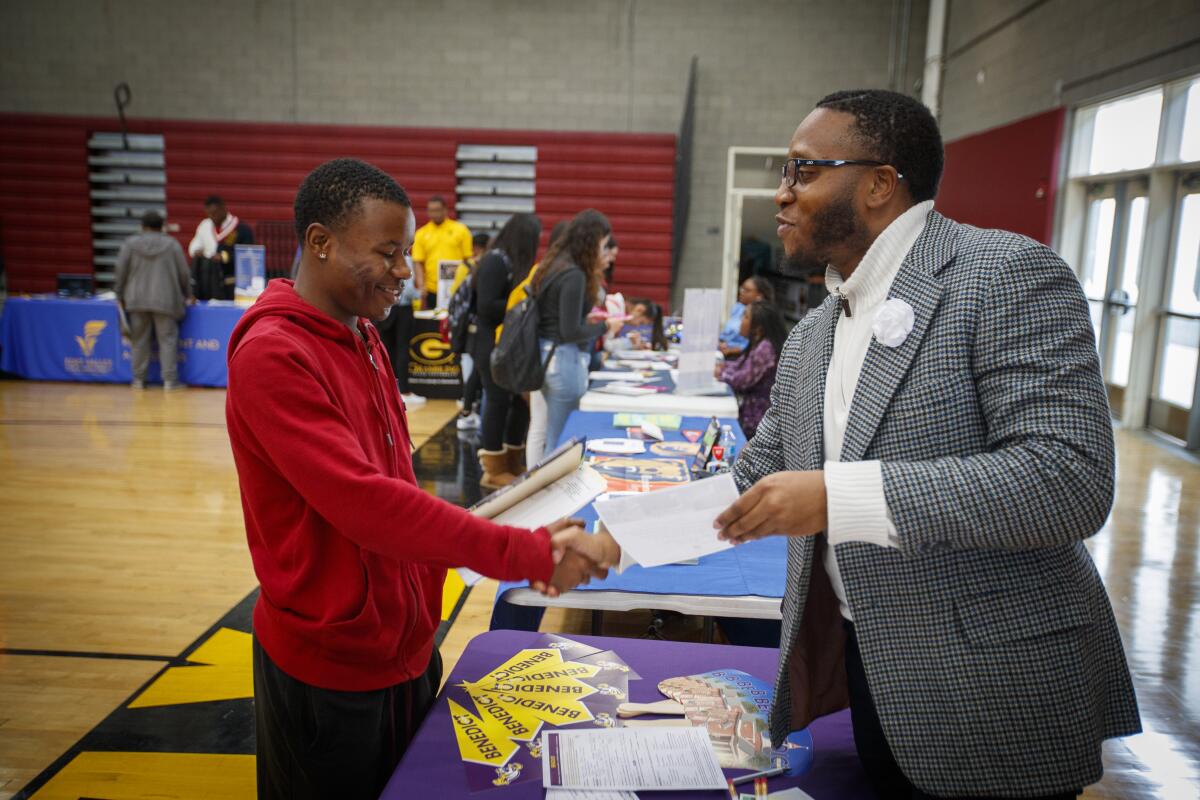Waiting for college decisions? In Lynwood, 381 admissions are offered in a day

- Share via
Kameron Pryor, a senior at Firebaugh High School in Lynwood, wanted to go to college but figured his grades wouldn’t get him very far, at least in California. His 2.47 GPA is below the average at the University of California and California State University.
But Wiley College, a four-year, historically black liberal arts institution in Texas, showered him with assurances during a visit to his high school last week. All you need is a 2.0 GPA and high school diploma or equivalent, campus admissions counselor Olivia Johnston told him. And if you can nudge up your GPA to a 2.5, she added, you can apply for a scholarship.
“Hee haw!” the elated Kameron said, trying out a Texas twang.
“You got the campus spirit already!” Johnston replied with a grin.
As high school seniors across the country enter the dreaded waiting period for college admissions decisions, this was a day of acceptance and affirmation for many low-income students who had struggled in high school. In a one-day visit to two high schools in the Lynwood Unified School District, Wiley and two dozen other historically black colleges and universities offered students 381 on-the-spot admissions and $5.8 million in scholarship awards.
“My job is to make sure students don’t feel defeated by their GPAs,” said Quen-Taylor Brown, admissions recruiter for Benedict College in Columbia, S.C. “Even if it’s low, there are lots of opportunities for college.”
Efforts to provide higher education to African Americans began proliferating after the Civil War, often in churches, old schoolhouses and even homes, at a time when most U.S. colleges shut them out. Today, the U.S. Department of Education recognizes more than 100 historically black colleges and universities, or HBCUs.

They have evolved over time, with some now struggling financially and many reaching out to broaden their enrollment beyond black students to recruit those of other races and ethnicities and from other countries. At Lynwood Unified, where 94% of students are Latino and less than 5% are black, the recruiters welcomed one and all.
Symphony Esqueda, a Mexican American student with a 4.5 GPA, has her eye on such top universities as Stanford, Yale, UC Berkeley and UCLA. But she said she had brief second thoughts when Bennett College, a private liberal arts campus for women in Greensboro, N.C., offered her an on-the-spot acceptance and full-ride scholarship at the recent event. With so much news about sexual violence on campuses, she said, maybe an all-women’s college would be safer.
Esqueda, who hopes to major in film, theater or creative writing, was also drawn to Dillard University in New Orleans after connecting with the gregarious recruiter who shared her love of the humanities.
“As much as prestige would be nice, a lot of HBCUs seemed really passionate about their programs, and I want to keep my options open,” Esqueda said.
She and other Latino students said they were open to attending a predominantly black institution. “A lot of universities are predominantly white, so going into an HBCU would not be a huge deal,” she said. “I already know I’m going to be a minority.”
Many HBCU campuses have struggled with low graduation rates. A study by the Education Trust nonprofit found that the average HBCU six-year graduation rate for black students in 2014 was 32.1% The study found, however, that HBCUs had higher success rates than institutions serving similar populations, such as low-income students.
Spelman College in Atlanta, for instance, has a six-year graduation rate of 76%, among the highest of HBCUs.
Low graduation rates aren’t unique to black colleges. The Cal State system, which requires a minimum 2.0 GPA for admission, launched a multimillion-dollar effort to improve, among other things, four-year graduation rates for first-time freshmen from 19% in 2015 to 40% by 2025, and six-year rates from 57% to 70% during that same time period.
Theresa Price, the founder of the National College Resources Foundation in Diamond Bar, organized the “HBCU Caravan” to Lynwood Unified. She plans to take it to 17 other California school districts over the next week. She started the first Black College Expo two decades ago in Los Angeles — the annual event took place Saturday at the Los Angeles Convention Center with more than 200 colleges and universities represented — and expanded it to 10 other cities.

The foundation also sponsors enrichment programs to help students with tutoring, mentoring, college applications, career planning and social and emotional support.
“I don’t want any kid to ever feel like they can never do anything or be anything,” said Price, a whirl of energy who freely gave out hugs and high fives to students and staff.
The effect of such affirmations was evident on the faces of the Firebaugh students who crowded into the gym with file folders of their academic transcripts for college representatives at tables bedecked with school colors, mascots and brochures.
Johnathon Vincson is still a junior but proudly showed off a letter of acceptance and scholarship offer of $57,120 for fall 2021 from Benedict College. Although he is considering Arizona State University for its business and engineering programs, he said Benedict’s instant offer had inspired him to “work even harder” to raise his 3.38 GPA and redouble efforts to prepare for the SAT later this year using free online programs.
Tyron Smith thought his low grades would mean that he would start his higher-education journey at a community college. But he’s now considering Florida A&M University in Tallahassee, impressed by the recruiter’s description of the computer science and football programs, two of his top interests.
“I didn’t think I could do much with a 2.5,” he said as he left the school’s orange and green table, which was decorated with images of its rattler mascot. “But if everything he told me holds up, this looks great.”
Kaneisha Johnson survived a tumultuous childhood of foster home placements, homelessness and, at one point, a 1.7 GPA until she raised it to a C average after working with the foundation’s enrichment program. She earned a two-year associate’s degree at Virginia University-Lynchburg, an HBCU campus, then came back to Lynwood to work as a peer counselor for Price’s foundation.
But her colleagues and friends are encouraging her to pursue her dream of a bachelor’s degree in education so she can work with students she has a particular heart for — those with special needs. Johnson resisted, she said, lacking confidence.
At the event last week, she mustered up her courage, applied to Paul Quinn College in Dallas and got an instant acceptance.
She burst into tears.
More to Read
Sign up for Essential California
The most important California stories and recommendations in your inbox every morning.
You may occasionally receive promotional content from the Los Angeles Times.














